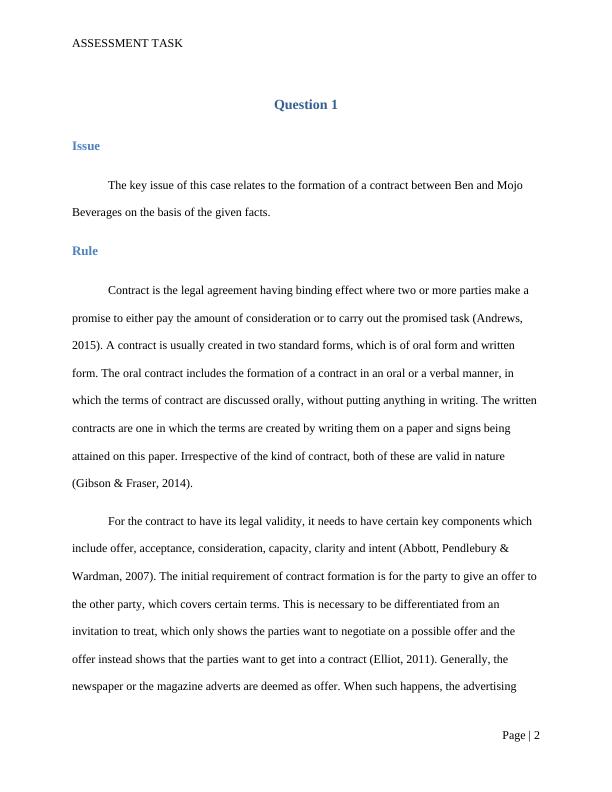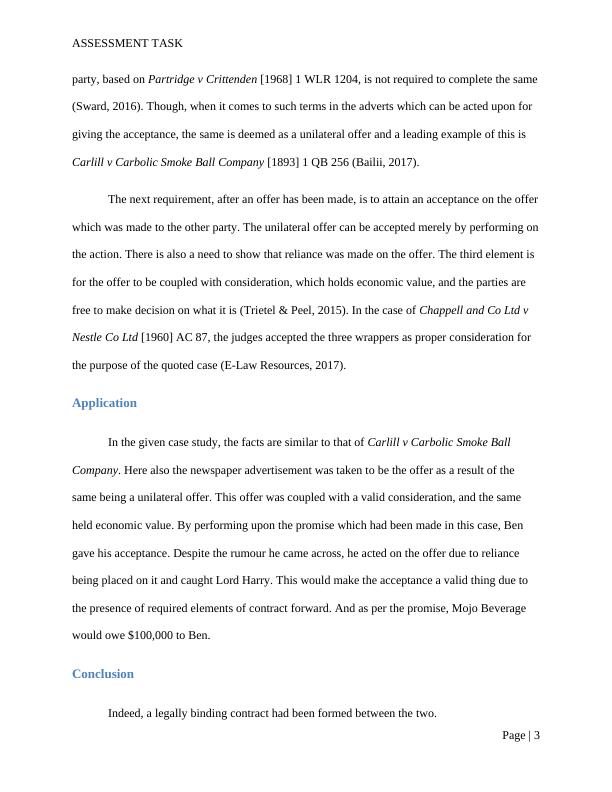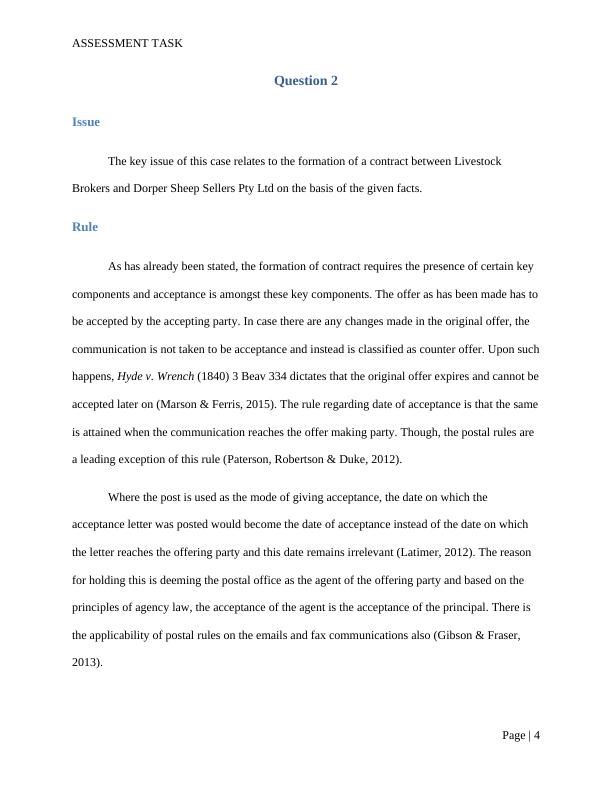Formation of Contract, Key Components and Legal Validity
Added on 2023-06-15
11 Pages2844 Words171 Views

ASSESSMENT TASK
Question 1
Issue
The key issue of this case relates to the formation of a contract between Ben and Mojo
Beverages on the basis of the given facts.
Rule
Contract is the legal agreement having binding effect where two or more parties make a
promise to either pay the amount of consideration or to carry out the promised task (Andrews,
2015). A contract is usually created in two standard forms, which is of oral form and written
form. The oral contract includes the formation of a contract in an oral or a verbal manner, in
which the terms of contract are discussed orally, without putting anything in writing. The written
contracts are one in which the terms are created by writing them on a paper and signs being
attained on this paper. Irrespective of the kind of contract, both of these are valid in nature
(Gibson & Fraser, 2014).
For the contract to have its legal validity, it needs to have certain key components which
include offer, acceptance, consideration, capacity, clarity and intent (Abbott, Pendlebury &
Wardman, 2007). The initial requirement of contract formation is for the party to give an offer to
the other party, which covers certain terms. This is necessary to be differentiated from an
invitation to treat, which only shows the parties want to negotiate on a possible offer and the
offer instead shows that the parties want to get into a contract (Elliot, 2011). Generally, the
newspaper or the magazine adverts are deemed as offer. When such happens, the advertising
Page | 2
Question 1
Issue
The key issue of this case relates to the formation of a contract between Ben and Mojo
Beverages on the basis of the given facts.
Rule
Contract is the legal agreement having binding effect where two or more parties make a
promise to either pay the amount of consideration or to carry out the promised task (Andrews,
2015). A contract is usually created in two standard forms, which is of oral form and written
form. The oral contract includes the formation of a contract in an oral or a verbal manner, in
which the terms of contract are discussed orally, without putting anything in writing. The written
contracts are one in which the terms are created by writing them on a paper and signs being
attained on this paper. Irrespective of the kind of contract, both of these are valid in nature
(Gibson & Fraser, 2014).
For the contract to have its legal validity, it needs to have certain key components which
include offer, acceptance, consideration, capacity, clarity and intent (Abbott, Pendlebury &
Wardman, 2007). The initial requirement of contract formation is for the party to give an offer to
the other party, which covers certain terms. This is necessary to be differentiated from an
invitation to treat, which only shows the parties want to negotiate on a possible offer and the
offer instead shows that the parties want to get into a contract (Elliot, 2011). Generally, the
newspaper or the magazine adverts are deemed as offer. When such happens, the advertising
Page | 2

ASSESSMENT TASK
party, based on Partridge v Crittenden [1968] 1 WLR 1204, is not required to complete the same
(Sward, 2016). Though, when it comes to such terms in the adverts which can be acted upon for
giving the acceptance, the same is deemed as a unilateral offer and a leading example of this is
Carlill v Carbolic Smoke Ball Company [1893] 1 QB 256 (Bailii, 2017).
The next requirement, after an offer has been made, is to attain an acceptance on the offer
which was made to the other party. The unilateral offer can be accepted merely by performing on
the action. There is also a need to show that reliance was made on the offer. The third element is
for the offer to be coupled with consideration, which holds economic value, and the parties are
free to make decision on what it is (Trietel & Peel, 2015). In the case of Chappell and Co Ltd v
Nestle Co Ltd [1960] AC 87, the judges accepted the three wrappers as proper consideration for
the purpose of the quoted case (E-Law Resources, 2017).
Application
In the given case study, the facts are similar to that of Carlill v Carbolic Smoke Ball
Company. Here also the newspaper advertisement was taken to be the offer as a result of the
same being a unilateral offer. This offer was coupled with a valid consideration, and the same
held economic value. By performing upon the promise which had been made in this case, Ben
gave his acceptance. Despite the rumour he came across, he acted on the offer due to reliance
being placed on it and caught Lord Harry. This would make the acceptance a valid thing due to
the presence of required elements of contract forward. And as per the promise, Mojo Beverage
would owe $100,000 to Ben.
Conclusion
Indeed, a legally binding contract had been formed between the two.
Page | 3
party, based on Partridge v Crittenden [1968] 1 WLR 1204, is not required to complete the same
(Sward, 2016). Though, when it comes to such terms in the adverts which can be acted upon for
giving the acceptance, the same is deemed as a unilateral offer and a leading example of this is
Carlill v Carbolic Smoke Ball Company [1893] 1 QB 256 (Bailii, 2017).
The next requirement, after an offer has been made, is to attain an acceptance on the offer
which was made to the other party. The unilateral offer can be accepted merely by performing on
the action. There is also a need to show that reliance was made on the offer. The third element is
for the offer to be coupled with consideration, which holds economic value, and the parties are
free to make decision on what it is (Trietel & Peel, 2015). In the case of Chappell and Co Ltd v
Nestle Co Ltd [1960] AC 87, the judges accepted the three wrappers as proper consideration for
the purpose of the quoted case (E-Law Resources, 2017).
Application
In the given case study, the facts are similar to that of Carlill v Carbolic Smoke Ball
Company. Here also the newspaper advertisement was taken to be the offer as a result of the
same being a unilateral offer. This offer was coupled with a valid consideration, and the same
held economic value. By performing upon the promise which had been made in this case, Ben
gave his acceptance. Despite the rumour he came across, he acted on the offer due to reliance
being placed on it and caught Lord Harry. This would make the acceptance a valid thing due to
the presence of required elements of contract forward. And as per the promise, Mojo Beverage
would owe $100,000 to Ben.
Conclusion
Indeed, a legally binding contract had been formed between the two.
Page | 3

ASSESSMENT TASK
Question 2
Issue
The key issue of this case relates to the formation of a contract between Livestock
Brokers and Dorper Sheep Sellers Pty Ltd on the basis of the given facts.
Rule
As has already been stated, the formation of contract requires the presence of certain key
components and acceptance is amongst these key components. The offer as has been made has to
be accepted by the accepting party. In case there are any changes made in the original offer, the
communication is not taken to be acceptance and instead is classified as counter offer. Upon such
happens, Hyde v. Wrench (1840) 3 Beav 334 dictates that the original offer expires and cannot be
accepted later on (Marson & Ferris, 2015). The rule regarding date of acceptance is that the same
is attained when the communication reaches the offer making party. Though, the postal rules are
a leading exception of this rule (Paterson, Robertson & Duke, 2012).
Where the post is used as the mode of giving acceptance, the date on which the
acceptance letter was posted would become the date of acceptance instead of the date on which
the letter reaches the offering party and this date remains irrelevant (Latimer, 2012). The reason
for holding this is deeming the postal office as the agent of the offering party and based on the
principles of agency law, the acceptance of the agent is the acceptance of the principal. There is
the applicability of postal rules on the emails and fax communications also (Gibson & Fraser,
2013).
Page | 4
Question 2
Issue
The key issue of this case relates to the formation of a contract between Livestock
Brokers and Dorper Sheep Sellers Pty Ltd on the basis of the given facts.
Rule
As has already been stated, the formation of contract requires the presence of certain key
components and acceptance is amongst these key components. The offer as has been made has to
be accepted by the accepting party. In case there are any changes made in the original offer, the
communication is not taken to be acceptance and instead is classified as counter offer. Upon such
happens, Hyde v. Wrench (1840) 3 Beav 334 dictates that the original offer expires and cannot be
accepted later on (Marson & Ferris, 2015). The rule regarding date of acceptance is that the same
is attained when the communication reaches the offer making party. Though, the postal rules are
a leading exception of this rule (Paterson, Robertson & Duke, 2012).
Where the post is used as the mode of giving acceptance, the date on which the
acceptance letter was posted would become the date of acceptance instead of the date on which
the letter reaches the offering party and this date remains irrelevant (Latimer, 2012). The reason
for holding this is deeming the postal office as the agent of the offering party and based on the
principles of agency law, the acceptance of the agent is the acceptance of the principal. There is
the applicability of postal rules on the emails and fax communications also (Gibson & Fraser,
2013).
Page | 4

End of preview
Want to access all the pages? Upload your documents or become a member.
Related Documents
Business Law Assignmentlg...
|11
|2821
|208
Commercial & Corporation Law Assignment (Doc)lg...
|8
|1867
|49
Business Law Assignment: Contract Formation and Elementslg...
|10
|2619
|339
Contract Law Issues and Promotional Offerslg...
|14
|2528
|483
Assignment on Australian Business Lawlg...
|15
|3384
|77
Remedies for Breach of Contract: Legal Advice for Adam vs Edwinlg...
|13
|4702
|458
